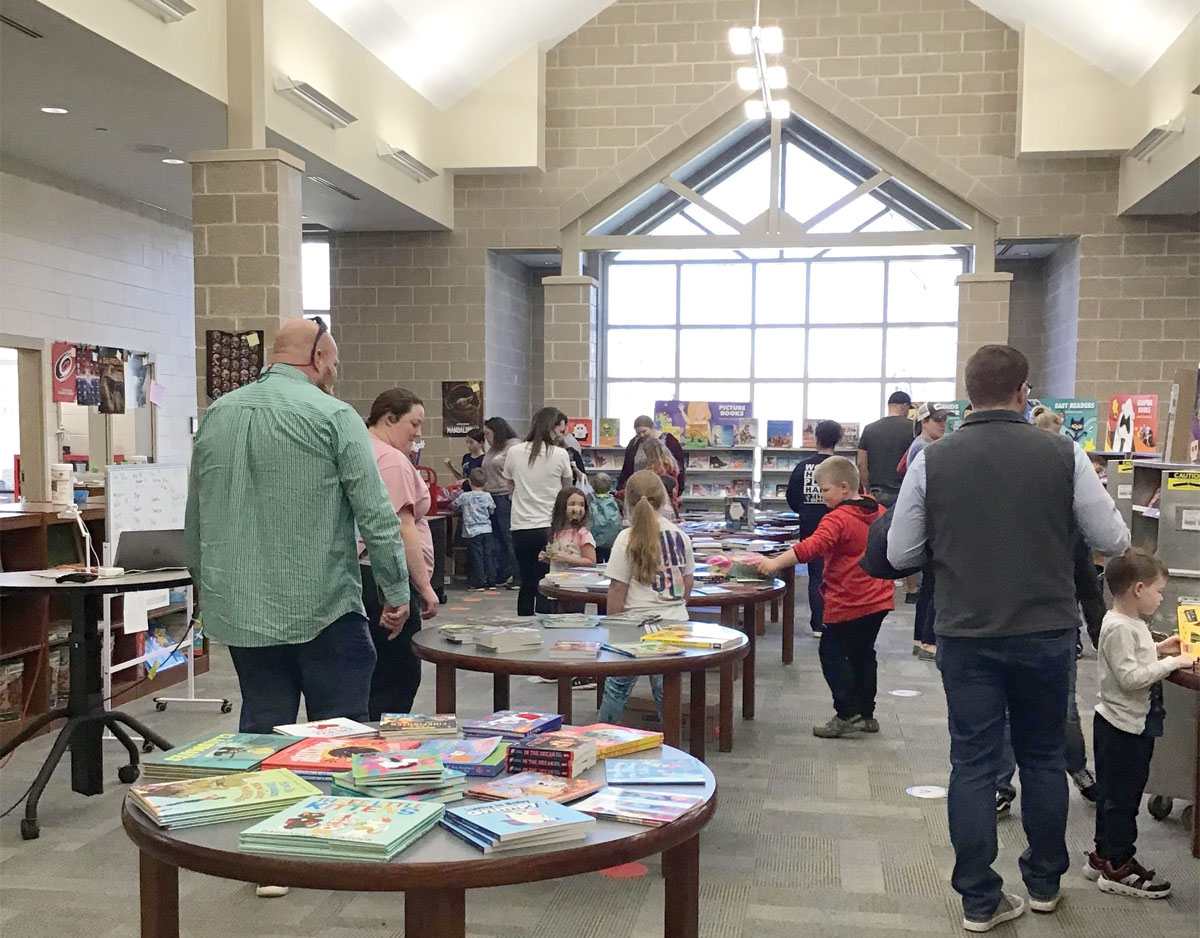Disaster Recovery Efforts Continue in the South, Los Angeles
Schools and public libraries are still navigating the aftermath of devastating flooding and wildfires.
 |
The Old Fort Elementary School library before the flood and damage.Photo courtsey of Greta Fletcher |
The images of floods and fires no longer dominate daily national news coverage, but the areas impacted by Hurricane Helene in September and the wildfires in January are still recovering, clearing debris, and trying to rebuild.
In September, Hurricane Helene flooded areas of North Carolina, Tennessee, South Carolina, and Georgia. The devastating flooding spread to inland locations across the southern Appalachian Mountains that typically don’t see that kind of catastrophic flooding from hurricanes. One such place was Old Fort, NC.
Old Fort Elementary experienced flooding from a nearby creek in the past, so four years ago when the town built a new school, it was designed to prevent such damage again.
When the warning came about Hurricane Helene, school staff thought maybe the library would get a little water. Librarian Greta Fletcher moved what she could higher and out of harm’s way. Or so she thought.
A deluge of rain over four days washed out Old Fort’s Main Street and caused major damage to the school. When Principal Jill Ward arrived at the building after the storm, there was about three feet of mud in the building, she says, along with sewage after the town’s system failed. Old Fort lost all three of its school buses, including one that was found over two miles away.
More than five months later, Old Fort students and staff are seven miles away, sharing space with Pleasant Gardens Elementary School. Seven miles in the mountains is not a 10-minute ride and, for a while, a bridge that had been swept away and the subsequent rerouted buses are making the trip to school at least 30 minutes longer for students. The cleaning and construction at Old Fort Elementary continues, and Ward’s job has become a seven-day-a-week position as she deals with FEMA and the Army Corps of Engineers while trying to make sure her students are educated and that staff and children receive help managing the trauma.
“There’s no playbook on how to be a principal during a hurricane,” she says.
Teaching and the trauma
Ward is not only dealing with the significantly damaged building but also with staff and students who have been through a traumatic situation.
“It has changed everything that we do,” says Ward. “It’s not just working on what I call ‘school stuff.’ There’s a lot more of the mental health pieces and the emotional pieces that you have to consider and look for resources and find ways to meet those needs for not just the students but also the adults.”
Three staff members lost their homes, and another's suffered significant damage. Not everyone in the school community made it to Pleasant Gardens. Thirteen students did not join their classmates at the temporary location. Some had homes that were damaged or destroyed by the flooding and families needed to move to find housing; others lived closer to a different school in the district and have gone there.
"It's been a journey, but we're learning a lot, and our kids have been—a lot of people don't like this word but—very resilient," says Ward. "Our teachers have been rock stars. They have assumed their responsibility. They have created classroom procedures and protocols. They're teaching, and our kids are thriving."
Ward and Fletcher have been touched by the support they have received from around the world. Old Fort received a donation from a school in Thailand that has also experienced severe flooding. In fact, the South Carolina school has gotten so much help for the school and its families, it has paid it forward by sharing some of the donations with schools in North Carolina and Tennessee that were impacted by Helene.
"It's just been humbling, but it's also been heartwarming to see the outpouring of support we have had," Ward says.
State of the library
As for the Old Fort library, Fletcher doesn’t know what she’ll have when she goes back. They salvaged some furniture, she says, but the state of the collection is unknown. The approximately 500 books that were checked out at the time of the hurricane are lost. The school relieved the families of that responsibility.
The restoration company tried to salvage some of the approximately 9,000 titles in the collection, according to Fletcher, but those books are stored in boxes that she can’t yet access.
“We’re anticipating a large cost to replace most of our books,” says Fletcher.
While people have donated books and others inquired about how to donate more titles, Fletcher has no place to store them and wants to make sure they recreate a well-curated collection.
“We had worked really hard to update our collection prior to the hurricane and meet the curriculum needs of the teachers and students, but also respect our community and their needs,” she says. "So we really hope to get a lot of monetary donations, so when we do a collection analysis, I can take it and work with Follett and make sure we get a collection that is up-to-speed and one of the most top-notch collections in the whole county."

Recovering from the California wildfires
As the South continues to recover, those impacted by the deadly and devastating Los Angeles County wildfires are still navigating the immediate aftermath of the tragedy.
“The Palisades are still completely devastated,” says Zibby Owens, owner of Zibby’s Publishing and Santa Monica, CA, bookstore Zibby’s Bookshop. “This will be an extremely long road, and people are mourning everywhere.”
The Palisades Branch Library, a branch of the Los Angeles Public Library (LAPL), was burned down in the fire. The long-term plan is to rebuild on the site, says LAPL branch services manager Joyce Cooper, but the timing is unknown. Debris is still being cleared on the branch property. Cooper lives outside of the areas impacted but says "you can still feel everybody reeling" and anxiety looms. With every rainfall, there is concern about mudslides and debris flows.
Palisades Branch staff has been reassigned to other locations and nearby branches have tried to pick up services needed by former Palisades patrons to help them navigate post-fire needs and paperwork. About 10 staff members lost their homes, according to Cooper. The Library Foundation of Los Angeles has two funds set up—one for those employees and another to support the Palisades rebuild, as well as a temporary location and services for people able to move back to the area, Cooper says.
Meanwhile, community members are stepping up to help schools and individual families in the area. Owens led an effort to replace the library collections for Los Angeles Unified School District’s Marquez Charter School and Palisades Charter Elementary, as well as three private schools—Village School, St. Matthew’s Parish School, and Seven Arrows Elementary—forced to relocate after their buildings were damaged or destroyed by the Palisades Fire. She recently added a fifth school, Palisades Charter School, to the project.
“This is something tangible,” says Owens. “It’s a need I can meet when there are so many needs in the community now that are completely unmeetable.”
Mackin learned of the effort and stepped in to help, significantly decreasing the fundraising needs. At least 15 authors, including Judy Blume and Jewell Parker Rhodes, have contributed, according to Owens, who raised $175,000 and was able to purchase 9,500 books for the schools.
Meredith Miller, Village School’s Information and Imagination Specialist, says they have received books from Owens and others. Having favorite titles in their new building brings “glimmers of joy” to the students.
“It’s just a comfort,” she says. “They know that reading a Mo Willems book will bring joy, or being able to look through a favorite book, or have a teacher do a read-aloud of the book that they all loved listening to, it just brings a sense of community and calmness.”
In another book-related effort, Children’s Books for Altadena is fundraising, purchasing, and distributing books to kids from the Altadena neighborhood that suffered so much damage.
RELATED
The job outlook in 2030: Librarians will be in demand
The job outlook in 2030: Librarians will be in demand
ALREADY A SUBSCRIBER? LOG IN
We are currently offering this content for free. Sign up now to activate your personal profile, where you can save articles for future viewing






Add Comment :-
Be the first reader to comment.
Comment Policy:
Comment should not be empty !!!